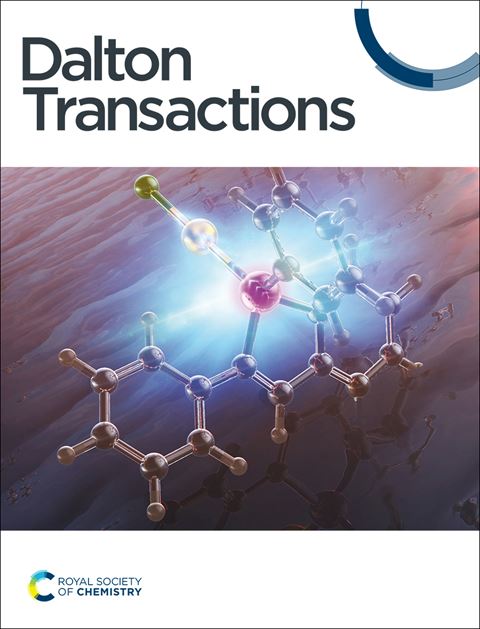构建具有三羧酸盐和 N-供体混合配体的二维锌(II)MOFs,用于多反应发光传感器和二氧化碳吸附
IF 3.5
3区 化学
Q2 CHEMISTRY, INORGANIC & NUCLEAR
引用次数: 0
摘要
ZnCl2-6H2O、苯-1,3,5-三苯甲酸(H3btb)和 N-杂环辅助咪唑(Im)或氨基嘧啶(amp)配体的溶热反应导致了二维(2D)锌基金属有机框架(MOFs)的产生、(Me2NH2)2[Zn2(btb)2(Im)2]-2DMF-3MeOH (1) 和 (Me2NH2)2[Zn2(btb)2(amp)]-H2O-2DMF-MeOH (2)。1 和 2 中的 btb3- 配体通过其羧基与 Zn(II)中心连接,形成了具有 (63) 蜂窝(hcb)拓扑结构的阴离子二维层状结构。在 hcb 网中加入 N-杂环辅助配体 Im 和 amp 后,就形成了二维氢键共价双层结构,具有两层相互渗透的网络。每个网络都由 Me2NH2 阳离子和溶剂分子占据的小通道组成。在室温下,1 和 2 在固态时都会发出蓝色荧光,并在检测丙酮和多种重金属离子(包括 Hg2+、Cu2+、Fe2+、Pb2+、Cr3+ 和 Fe3+)时表现出极高的选择性和灵敏度。在 1 巴压力下,活化 1 和活化 2 在室温下对二氧化碳的吸附能力适中,对二氧化碳的吸附能力优于对 N2 的吸附能力。值得注意的是,在较高压力下(高达 20 巴),活化样品 1 和 2 的二氧化碳吸附能力随温度而增强,同时保持良好的稳定性。本文章由计算机程序翻译,如有差异,请以英文原文为准。
Construction of 2D zinc(II) MOFs with tricarboxylate and N-donor mixed ligands for multiresponsive luminescence sensor and CO2 adsorption
The solvothermal reactions of ZnCl2·6H2O, benzene-1,3,5-tribenzoic acid (H3btb), and N-heterocyclic ancillary imidazole (Im) or aminopyrimidine (amp) ligands led to the creation of two-dimensional (2D) zinc(II) based metal-organic frameworks (MOFs), (Me2NH2)2[Zn2(btb)2(Im)2]·2DMF·3MeOH (1) and (Me2NH2)2[Zn2(btb)2(amp)]·H2O·2DMF·MeOH (2). The btb3− ligands in 1 and 2 form anionic 2D layered structure with a (63) honeycomb (hcb) topology by linking to Zn(II) centres through their carboxylate groups. The incorporation of N-heterocyclic auxiliary ligands Im and amp into the hcb nets resulted in the formation of a 2D hydrogen-bonded and covalently pillared bilayer structure featuring two-fold interpenetrating networks. Each of these networks consists of small channels that are occupied by Me2NH2 cations and solvent molecules. Both 1 and 2 emit blue luminescent emissions in the solid-state at room temperature and exhibit a great selectivity and sensitivity for the detection of acetone and multiple heavy metal ions including Hg2+, Cu2+, Fe2+, Pb2+, Cr3+, and Fe3+ ions. At 1 bar, activated 1 and 2 demonstrate moderate capacities for adsorbing CO2 at room temperature, with a preference for CO2 over N2. Notably, at higher pressures (up to 20 bar) their activated samples 1 and 2 show a temperature-dependent enhancement of CO2 uptake while retaining good stability.
求助全文
通过发布文献求助,成功后即可免费获取论文全文。
去求助
来源期刊

Dalton Transactions
化学-无机化学与核化学
CiteScore
6.60
自引率
7.50%
发文量
1832
审稿时长
1.5 months
期刊介绍:
Dalton Transactions is a journal for all areas of inorganic chemistry, which encompasses the organometallic, bioinorganic and materials chemistry of the elements, with applications including synthesis, catalysis, energy conversion/storage, electrical devices and medicine. Dalton Transactions welcomes high-quality, original submissions in all of these areas and more, where the advancement of knowledge in inorganic chemistry is significant.
 求助内容:
求助内容: 应助结果提醒方式:
应助结果提醒方式:


